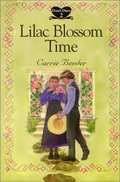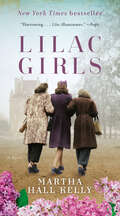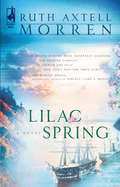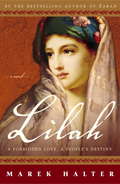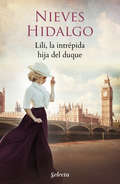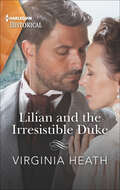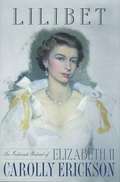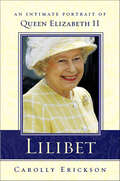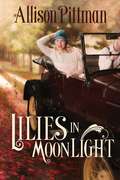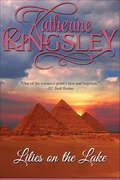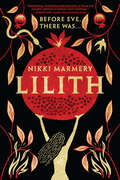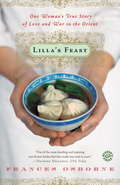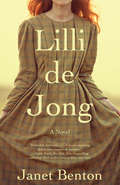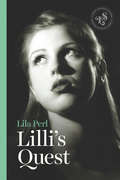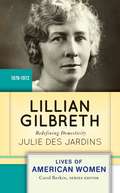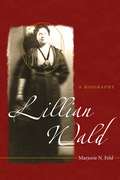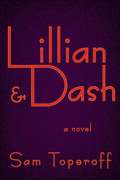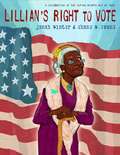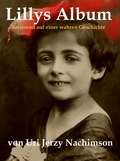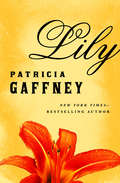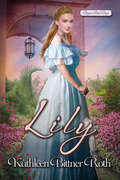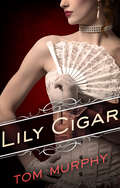- Table View
- List View
Lilac Blossom Time (Dora's Diary #2)
by Carrie BenderDora returns to her parents in Pennsylvania and serves as a companion for Mrs. Worthington. She hears tales of the Underground Railroad and of pioneers in the West. With Worthington, Dora visits in California and sees Matthew over Valentine's Day!
Lilac Girls: A Novel (Woolsey-Ferriday)
by Martha Hall Kelly<P>For readers of The Nightingale and Sarah’s Key, inspired by the life of a real World War II heroine, this remarkable debut novel reveals the power of unsung women to change history in their quest for love, freedom, and second chances. <P>New York socialite Caroline Ferriday has her hands full with her post at the French consulate and a new love on the horizon. But Caroline’s world is forever changed when Hitler’s army invades Poland in September 1939—and then sets its sights on France. <P>An ocean away from Caroline, Kasia Kuzmerick, a Polish teenager, senses her carefree youth disappearing as she is drawn deeper into her role as courier for the underground resistance movement. In a tense atmosphere of watchful eyes and suspecting neighbors, one false move can have dire consequences. <P>For the ambitious young German doctor, Herta Oberheuser, an ad for a government medical position seems her ticket out of a desolate life. Once hired, though, she finds herself trapped in a male-dominated realm of Nazi secrets and power. <P> The lives of these three women are set on a collision course when the unthinkable happens and Kasia is sent to Ravensbrück, the notorious Nazi concentration camp for women. Their stories cross continents—from New York to Paris, Germany, and Poland—as Caroline and Kasia strive to bring justice to those whom history has forgotten. <P><b>A New York Times Bestseller</b>
Lilac Spring
by Ruth Axtell MorrenDaughter of a prominent nineteenth-century Maine shipbuilder, Cherish Winslow had a deep love for ships, the ocean--and her father's apprentice, Silas van der Zee. Once his childhood companion in Haven's End, Cherish wished Silas could see she was no longer a girl in pigtails but a woman in love.To Silas, Cherish was a beacon of light, illuminating his lonely life...yet he doubted a lowly apprentice could win the heart of such an elegant young lady. A stolen kiss brought a moment's hope...but he soon found himself tossed out on the street, with no job, no home, no chance of a future. In his darkest hour, Silas must find the strength to fight for his life--and for his beloved Cherish.
Lilah
by Marek HalterI can't be with those who throw stones at women and children. It's beyond me. Beyond my love for Ezra. Beyond my respect for God. In 397 BC, in Susa, the opulent capital of the Persian empire, where the Jews are living in exile, young Lilah is destined for a happy life: she is due to marry Antinoes, a great Persian warrior well known at the king's court. But her beloved brother Ezra, with whom she has been close since childhood, is opposed to this marriage with a foreigner. If Lilah insists, she will have to renounce Ezra, and that is something she cannot do, for she senses that he has been chosen by God to lead the exiled Jews to Jerusalem and, after centuries of displacement, revive the laws of Moses: laws which promote justice and give human life a meaning. Abandoning the promise of a golden future, Lilah urges her brother to leave for Jerusalem and gives him new hope that a return to the Promised Land is possible. But Ezra, blinded by faith, orders the rejection of all foreign wives. At the risk of losing the one person she still has left in her life, Lilah opposes her brother's fanaticism, thereby ensuring the survival of the women and children condemned to leave the city. But her opposition comes at great personal cost . . . Lilah concludes Marek Halter's trilogy about Biblical heroines. Sarah, Abraham's barren wife, brought her personal destiny to bear in the creation of a new religion. Zipporah, Moses wife, fought against racism and exclusion. By speaking out against religious extremism, of which women are the first victims, Lilah proves herself a champion of freedom.
Lili, la intrépida hija del duque (Un romance en Londres #Volumen)
by Nieves HidalgoVuelve Nieves Hidalgo. Vuelve «Un romance en Londres» con la historia de Lili, personaje de Rivales de día, amantes de noche. Una historia de amor aparentamente difícil y llena de secretos.¿Que pasará cuando salga a la luz toda la verdad? 1818. Una mujer no debe ejercer ciertas actividades, sobre todo si pertenece a la burguesía y es hija de un duque. Pero Liliana Chambers no está de acuerdo ni con las estrictas normas sociales que constriñen a la mujer, ni con el modo de actuar de un Gobierno que no tiene en cuenta a los desfavorecidos de la sociedad. Y se rebela emitiendo octavillas de carácter subversivo que ponen al regente, a los pares y a todo Londres en estado de alarma. Desconocedor de sus actividades, pero sabiendo que visita las zonas peligrosas de la ciudad para ayudar a los necesitados, el duque de Hatfield pide al vizconde de Weymouth, un buen amigo de la familia, que haga de guardaespaldas de su hija. A Liliana le incomoda estar vigilada. A Patrick no le gusta tener que servir de niñera; tiene otros asuntos que resolver, como encontrar a P, que es quien firma los pasquines subversivos. Ella ignora que él quiere descubrirla. Él, que es justo su protegida la que actúa en las sombras. Sobre Rivales de día, amantes de noche se ha dicho...«Me encantan las novelas románticas de corte histórico, son mis favoritas, pero si además están ambientadas en la Regencia inglesa, puedo decir sin equivocarme que no me van a defraudar. Este es el caso de Rivales de día, amantes de noche de Nieves Hidalgo. [...] Personalmente no puedo pedir más, porque disfrutar de la trama ha hecho que descubra unos protagonistas con mucha química y que me entren ganas de descubrir el siguiente volumen de la saga.»Blog Promesas de amor
Lilian and the Irresistible Duke: Secrets Of A Victorian Household (Secrets of a Victorian Household #4)
by Virginia HeathA timeless historical romance, perfect for fans of Netflix’s Bridgerton! A reunion in Rome… sparks an affair to remember!** Responsible widow Lilian Fairclough is persuaded to travel to Rome for a hard-earned break and to let down her hair! She’s surprised to be reunited with bold yet cynical Italian duke Pietro Venturi. He reawakens her sensual side and intrigues her with glimpses of pain beneath his rakish surface. Enticed into a secret and temporary affair, what will happen once she returns home? Experience more passionate historical romance twists and turns with the rest of the Secrets of a Victorian Household series: Miss Lottie’s Christmas Protector Miss Amelia’s Misltetoe Marquess Mr. Fairclough’s Inherited Bride From Harlequin Historical: Your romantic escape to the past.
Lilibet: An Intimate Portrait of Elizabeth II
by Carolly EricksonWith her customary psychological insight, historian Erickson traces the queen's gilded but often thorny path from her overprotected girlhood to her ascension to the throne at twenty-five to her personal and national difficulties as queen.
Lilibet: An Intimate Portrait of Elizabeth II
by Carolly EricksonIn Lilibet, master biographer Carolly Erickson turns her skill at writing un-put-downable narrative to telling the remarkable story of Elizabeth II, Queen of England.With her customary psychological insight, historian Erickson traces the queen's gilded but often thorny path from her overprotected girlhood to her ascension to the throne at twenty-five to her personal and national difficulties as queen.Lilibet shows us an Elizabeth we thought we knew-but shows her in a different light: as a small, shy woman with a sly and at times raucous sense of humor, a woman who appears stiff in public, but in private enjoys watching wrestling on TV. A woman most at home among her horses and dogs. And a woman long annealed to heartbreak and sorrow, who has presided over the decline of Great Britain and the decline in prestige of her own Windsor dynasty.Far from being a light, gossipy treatment of a celebrity, Lilibet tells the queen's story from her point of view, letting the reader relive Elizabeth's long and eventful life with all its splendid ceremonies, momentous responsibilities and family clashes. Through it all we glimpse, as never before, the strong and appealing sovereign who has ruled over her people for half a century and more, a ruler of immense wealth, international esteem and high character whose daily life is grounded in the bedrock of common sense.
Lilies in Moonlight: A Novel
by Allison K. PittmanHe'd lost his zest for life. She was just lost. Will they find the healing and love they long for? After a roaring night on the town, fun-loving flapper Lilly Margolis, dazed and disoriented, twists her ankle and falls into the backyard of a wealthy family where the effects of the Great War--over for more than half a decade--are still endured. Inside the walls of the Burnside mansion, Cullen Burnside, a disillusioned and disfigured veteran, and his widowed mother, Betty Ruth, who daily slips a little further into dementia, lead a lonely existence ... until Lilly. Whimsical, lighthearted, and beautiful, she rejuvenates their sad, disconnected lives and blossoms in the light of their attention. But Lilly, like Cullen, is hiding from a painful past. And when Cullen insists on returning her to her faraway home, their budding attraction seems destined to die on the vine. The resulting road trip becomes a journey of self-discovery--but what will Cullen and Lilly find at journey's end?From the Trade Paperback edition.
Lilies on the Lake
by Katherine KingsleyPip Merriem is taking a trip to Egypt with her friend Isabel, who reveals she is pregnant and planning to give birth abroad. Pip has to send for help and happens to call John Henry, a man whose heart she had broken ten years ago. Will John be able to make Pip once again fall in love with him?
Lilies on the Lake
by Katherine KingsleyAn adventure ends in tragedy half a world away from Victorian London, leaving a noblewoman desperate for a miracle. From bestselling author Katherine Kingsley.&“A well-written, emotional, character-driven novel that is both sensual and inspirational.&” – Romance Reviews Today&“Fans of historical romances will enjoy Katherine Kingsley&’s second chance at love tale.&” – The Midwest Book ReviewPortia Merriem is about to embark on an adventure in Egypt, enjoying thrilling excavations along the Nile. But her plans are upended when tragedy befalls her pregnant traveling companion, leaving Portia alone in a strange land to raise her friend&’s child as her own. Desperate for rescue, the last person she imagined arriving is John Henry Lovell, her childhood friend and protector who doesn&’t seem to recognize her.Little does Portia know that John has loved her all of his life, and ran away from Norfolk to escape the pain of his unrequited love. Face-to-face with her again, alone and vulnerable in a foreign land, the only way she can return to England and avoid the scandal of being a woman alone with a child, is to marry John and live as husband and wife. &“A well-written love story peopled with decent characters and a very tender and spiritually moving romance, capturing all the hallmarks of Ms. Kingsley&’s works.&” – Romantic Times&“Warm [and] sensual.&” - Booklist
Lilith: A Novel
by Nikki MarmeryA triumphantly feminist retelling of ancient creation myths in the tradition of Madeline Miller and Claire North.Lyrically rendered, this epic U.S. debut tells the story of the woman known as Adam's first wife and her fall from Paradise and quest for revenge.Before Eve, there was Lilith.Lilith and Adam are equal and happy in the Garden of Eden. Until Adam decides Lilith should submit to his will and lie beneath him. She refuses—and is banished forever from Paradise.Demonized and sidelined, Lilith watches in fury as God creates Eve, the woman who accepts her submission. But Lilith has a secret: she has already tasted the fruit of the Tree of Knowledge. Endowed with Wisdom, she knows why Asherah—God&’s wife and equal, the Queen of Heaven—is missing. Lilith has a plan: she will rescue Eve, find Asherah, restore balance to the world, and regain her rightful place in Paradise. Lilith&’s quest for justice drives her throughout history, from the ziggurats of Ancient Sumer, to the court of Israel&’s Queen Jezebel, and to the side of a radical preacher in Roman Judea. Noah&’s wife, Norea, Jezebel and Mary Magdalene all play their part in Lilith&’s enlightenment. In the modern age, as she observes the catastrophic consequences of a world built on inequality, Lilith finally understands what must be done to correct the wrong done to women—and all humankind—at the beginning of time.Inspired by ancient myths and suppressed scriptures, Lilith is a thought-provoking and ambitious novel with an evocative literary voice and a triumphantly engaging heroine.
Lilla's Feast
by Frances OsborneAt the end of her life, Frances Osborne's one-hundred-year-old great-grandmother Lilla was as elegant as ever-all fitted black lace and sparkling-white diamonds. To her great-grandchildren, Lilla was both an ally and a mysterious wonder. Her bedroom was filled with treasures from every exotic corner of the world. But she rarely mentioned the Japanese prison camps in which she spent much of World War II, or the elaborate cookbook she wrote to help her survive behind the barbed wire. Beneath its polished surface, Lilla's life had been anything but effortless. Born in 1882 to English parents in the beautiful North China port city of Chefoo, Lilla was an identical twin. Growing up, she knew both great privilege and deprivation, love and its absence. But the one constant was a deep appreciation for the power of food and place. From the noodles of Shanghai to the chutney of British India and the roasts of England, good food and sensuous surroundings, Lilla was raised to believe, could carry one a long way toward happiness. Her story is brimming with the stuff of good fiction: distant locales, an improvident marriage, an evil mother-in-law, a dramatic suicide, and two world wars.Lilla's remarkable cookbook, which she composed while on the brink of starvation, makes no mention of wartime rations, of rotten vegetables and donkey meat. In the world this magical food journal, now housed in the Imperial War Museum in London, everyone is warm and safe in their homes, and the pages are filled with cream puffs, butterscotch, and comforting soup. In its writing, Lilla was able to transform the darkest moments into scrumptious escape.Lilla's Feast is a rich evocation of a bygone world, the inspiring story of an ordinary woman who tackled the challenges life threw in her path with an extraordinary determination.From the Hardcover edition.
Lilli de Jong: A Novel
by Janet BentonA young woman finds the most powerful love of her life when she gives birth at an institution for unwed mothers in 1883 Philadelphia. She is told she must give up her daughter to avoid lifelong poverty and shame. But she chooses to keep her. Pregnant, left behind by her lover, and banished from her Quaker home and teaching position, Lilli de Jong enters a home for wronged women to deliver her child. She is stunned at how much her infant needs her and at how quickly their bond overtakes her heart. Mothers in her position face disabling prejudice, which is why most give up their newborns. But Lilli can’t accept such an outcome. Instead, she braves moral condemnation and financial ruin in a quest to keep herself and her baby alive. Confiding their story to her diary as it unfolds, Lilli takes readers from an impoverished charity to a wealthy family's home to the streets of a burgeoning American city. Drawing on rich history, Lilli de Jong is both an intimate portrait of loves lost and found and a testament to the work of mothers. "So little is permissible for a woman," writes Lilli, “yet on her back every human climbs to adulthood.”
Lilli's Quest
by Lila PerlGermany on the cusp of World War II. Hitler has risen to power, and the Jews are being taken away from their homes in the middle of the night, forced to wear yellow stars, their businesses smashed, their lives in ruins. In the middle of all this is Lilli Frankfurter, a half-Jewish girl on the cusp of adolescence, her life and family thrust into the midst of a danger she has only begun to understand.In the stunning sequel to Isabel's War, Lila Perl, who completed this book just months before her death, brings wartime Germany, England, and America to life through Lilli's eyes. From Kristallnacht to hiding in her grandparents' attic to the Kindertransports that take her to an isolated farm in the English countryside, separated from her family, Lilli must repeatedly hide her identity in order to stay alive. In her final novel, Perl brilliantly evokes Lilli's desperate journey to America-as well as her brave quest back to Europe to find out if anything is left of her family.
Lillian Gilbreth
by Julie Des JardinsLillian Gilbreth is a stunning example of female ingenuity in the early twentieth century. At a time when women were standard fixtures in the home and barely accepted in many professions, Gilbreth excelled in both spheres, concurrently winning honors as “Engineer of the Year” and “Mother of the Year. ” This accessible, engaging introduction to the life of Lillian Gilbreth examines her pivotal role in establishing the discipline of industrial psychology, her work as an engineer of domestic management and home economics, and her role as mother of twelve children—made famous by the book, and later movie,Cheaper by the Dozen. This book examines the life of an exceptional woman who was able to negotiate the divide between the public and domestic spheres and define it on her terms. About the Lives of American Women series: Selected and edited by renowned women’s historian Carol Berkin, these brief biographies are designed for use in undergraduate courses. Rather than a comprehensive approach, each biography focuses instead on a particular aspect of a women’s life that is emblematic of her time, or which made her a pivotal figure in the era. The emphasis is on a “good read,” featuring accessible writing and compelling narratives, without sacrificing sound scholarship and academic integrity. Primary sources at the end of each biography reveal the subject’s perspective in her own words. Study questions and an annotated bibliography support the student reader.
Lillian Gilbreth
by Julie Des JardinsLillian Gilbreth is a stunning example of female ingenuity in the early twentieth century. At a time when women were standard fixtures in the home and barely accepted in many professions, Gilbreth excelled in both spheres, concurrently winning honors as "Engineer of the Year" and "Mother of the Year." This accessible, engaging introduction to the life of Lillian Gilbreth examines her pivotal role in establishing the discipline of industrial psychology, her work as an engineer of domestic management and home economics, and her role as mother of twelve children--made famous by the book, and later movie, Cheaper by the Dozen. This book examines the life of an exceptional woman who was able to negotiate the divide between the public and domestic spheres and define it on her terms. About the Lives of American Women series:Selected and edited by renowned women's historian Carol Berkin, these brief biographies are designed for use in undergraduate courses. Rather than a comprehensive approach, each biography focuses instead on a particular aspect of a women's life that is emblematic of her time, or which made her a pivotal figure in the era. The emphasis is on a "good read," featuring accessible writing and compelling narratives, without sacrificing sound scholarship and academic integrity. Primary sources at the end of each biography reveal the subject's perspective in her own words. Study questions and an annotated bibliography support the student reader.
Lillian Wald
by Marjorie N. FeldFounder of Henry Street Settlement on New York's Lower East Side as well as the Visiting Nurse Service of New York, Lillian Wald (1867-1940) was a remarkable social welfare activist. She was also a second-generation German Jewish immigrant who developed close associations with Jewish New York even as she consistently dismissed claims that her work emerged from a fundamentally Jewish calling. Challenging the conventional understanding of the Progressive movement as having its origins in Anglo-Protestant teachings, Marjorie Feld offers a critical biography of Wald in which she examines the crucial and complex significance of Wald's ethnicity to her life's work. In addition, by studying the Jewish community's response to Wald throughout her public career from 1893 to 1933, Feld demonstrates the changing landscape of identity politics in the first half of the twentieth century.Feld argues that Wald's innovative reform work was the product of both her own family's experience with immigration and assimilation as Jews in late-nineteenth-century Rochester, New York, and her encounter with Progressive ideals at her settlement house in Manhattan. As an ethnic working on behalf of other ethnics, Wald developed a universal vision that was at odds with the ethnic particularism with which she is now identified. These tensions between universalism and particularism, assimilation and group belonging, persist to this day. Thus Feld concludes with an exploration of how, after her death, Wald's accomplishments have been remembered in popular perceptions and scholarly works. For the first time, Feld locates Wald in the ethnic landscape of her own time as well as ours.
Lillian and Dash: A Novel of Hellman and Hammett
by Sam ToperoffThis exciting novel about Dashiell Hammett (The Maltese Falcon and The Thin Man) and Lillian Hellman (The Children's Hour) reintroduces their larger-than-life personalities and the vicissitudes of their affair that spanned three decades. Toperoff reimagines the highs and lows of a fast-living, hard-drinking literary couple, and their individual passions, projects, and literary creations. Hammett and Hellman's relationship evolves during major artistic and political epochs--Hollywood's heyday, the New York literary scene, the Spanish Civil War, McCarthyism, and both world wars--and each movement is captured with subjectivity and credible insight. Populated with writers, drinkers, filmmakers, and revolutionaries, Lillian and Dash chronicles the unusual affair of two prominent and headstrong figures.
Lillian's Right to Vote: A Celebration of the Voting Rights Act of 1965
by Jonah Winter Shane W. EvansAn elderly African American woman, en route to vote, remembers her family's tumultuous voting history in this picture book publishing in time for the fiftieth anniversary of the Voting Rights Act of 1965. As Lillian, a one-hundred-year-old African American woman, makes a "long haul up a steep hill" to her polling place, she sees more than trees and sky--she sees her family's history. She sees the passage of the Fifteenth Amendment and her great-grandfather voting for the first time. She sees her parents trying to register to vote. And she sees herself marching in a protest from Selma to Montgomery. Veteran bestselling picture-book author Jonah Winter and Coretta Scott King Illustrator Award winner Shane W. Evans vividly recall America's battle for civil rights in this lyrical, poignant account of one woman's fierce determination to make it up the hill and make her voice heard.<P><P> Jane Addams Children’s Book Honors Winner
Lillies, Rabbits and Painted Eggs: The Story of the Easter Symbols
by Edna BarthFrom the dust jacket, "Painted eggs, newborn chicks, white lilies, new clothes, a lighted candle. All these stand for Easter just as angels and reindeer stand for Christmas, or witches and pumpkins for Halloween. From place to place, the symbols of Easter may vary. But no matter where they are found, each has a story that reaches back hundreds, even thousands of years. Edna Barth traces the histories of these symbols in a clear, direct way, and shows how many of them were incorporated into Christianity from early pagan rites, then handed down to us as the colorful Easter customs we enjoy today. Whether the unique Easter rabbit of Fredericksburg, Texas, or exploding firecrackers in Florence, Italy, every Easter symbol expresses hope, joy in living, and wonder at the miracle of new life--feelings shared by people everywhere. Warmly written, this is a book to be discovered and read with pleasure by young readers of all faiths." Includes a list of other books of Easter customs and stories and an index.
Lillys Album: basierend auf einer wahren Geschichte
by Uri J. NachimsonDieser ungewöhnliche Roman wurde von mir geschrieben, dem Sohn eines Holocaust-Überlebenden, und basiert auf den Prüfungen und den Anfechtungen, die meiner Familie im Ersten und Zweiten Weltkrieg ausgesetzt war. Es ist eine herzzerreißende Geschichte einer Reise von jugendlichen Hoffnungen und Träumen bis hin zu Verzweiflung und schließlich dem Tod. Die Geschichte handelt von tiefer Liebe, der Sinnlosigkeit des Kriegs und der Auslöschung von unschuldigen Menschen, nur weil sie einen anderen Glauben hatten. Der Roman basiert auf einer wahren Geschichte und hat mich drei Jahre an Recherche und unzähligen Reisen nach Polen gekostet. Das Buch ist keine leichte Kost und richtet sich an erwachsene Leser.
Lily
by Patricia GaffneyA young noblewoman, fleeing from the darkness of her past, falls into life as a housemaid at a country manor—and into the arms of the lord who owns it Born a lady, but now orphaned and left to the care of distant relations, Lily Trehearne&’s fortunes are low indeed. All she inherited from her spendthrift father is a tangled web of debt, and her ultra-pious guardian, the Reverend Roger Soames, seems determined to marry her off to his son Lewis. Determined to save herself from that dreary fate, Lily panics and flees to Cornwall. Under the pseudonym Lily Troublefield, she accepts the first position she is offered, as a housemaid at the ominously named Darkstone Manor, property of Devon Darkwell. Lily&’s new master is eccentric, deeply troubled . . . and strangely irresistible.
Lily (Bayou Bad Boys #3)
by Kathleen Bittner RothFor fans of Rosemary Rogers and Janelle Taylor, a sweeping New Orleans romance of wild passion, dark secrets and forbidden love . . . Returning home to his beloved New Orleans after months in Jamaica, Bastien Thibodeaux reluctantly agrees to take two passengers on board his ship—an older English gentleman tending his ailing younger wife, Lily. That&’s their story, at least. But as Bastien uses his skills as a Cajun healer to help Lily, he becomes convinced of two things: She is not who she claims to be. And though she may be out of bounds for the illegitimate son of a bayou priestess, their attraction is decidedly mutual. When Lily&’s father bequeathed her his entire estate, he unwittingly made her a target. She barely escaped England alive, aided by her godfather. New Orleans holds both temptation and danger as she convalesces in Bastien&’s lavish residence. A single night together is all she dares allow. But once they succumb, there can be no denying this desire, or how much they&’ll risk in its name . . . &“Roth brings the heat of New Orleans right through the pages in both the romantic chemistry and appealing descriptions of the area.&” —Booklist
Lily Cigar
by Tom MurphyA historical saga of one strong woman’s journey from poverty and servitude in New York City to a new life in turn-of-the-century San Francisco. At ten, Lily Malone watched her mother die in their shabby apartment on Mulberry Street. Ma’s last wish was for Lily to keep an eye on her wild, rebellious brother—but after the two children move into the Catholic orphanage, she’s helpless to stop Fergy from abandoning her and heading out west to find gold in California. With the last of her family gone, Lily has little choice but to eventually accept a position in another family’s household. They’re Irish like her, but far wealthier—and it is here that the innocent girl begins to understand that she has little to bargain with aside from her beauty. This is the story of a young woman fighting her way out of hardship, as she learns to sell her body at an elegant brothel; becomes a mother desperately trying to keep the truth from her daughter; and finally is forced by love to return to the city of her shame and seek to conquer it. Moving from tenement squalor to the Fifth Avenue splendor of old New York, from the rolling decks of a great clipper ship to the brawling streets and magnificent Nob Hill mansions of San Francisco, through storm and earthquake and fire, Lily Cigar is a breathless saga of love, intrigue, and illicit passion.
